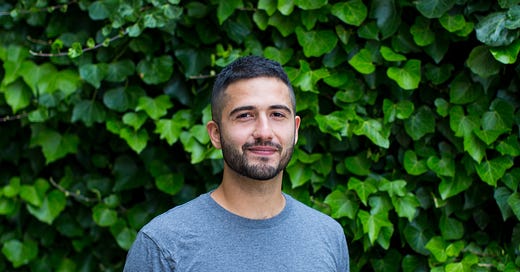How Sqool’s Cofounder Karim El-Hajj Accelerated His Career with SQL & Teaches Data Science
Karim taught himself SQL and became the right-hand data scientist for executives at Sonder. He shares the challenges of working with real-world data and how that has shaped Sqool's curriculum.
About Karim
Karim El-Hajj is the Cofounder of Sqool, teaching tech operators the analytics skills they *really* need to be impactful, and is now co-founding Jane, a climate-tech startup that helps homeowners turn their homes net zero. Previously, he was an early employee at Sonder. He most recently graduated with an MBA from Harvard Business School.
📣 Want to learn SQL? Sign up for our 6-week program. Or check out our curriculum materials to learn at your own pace.
Tell me about your journey into data.
My background is in accounting and finance. I joined Sonder in Business Operations and Analytics to run management reporting, build forecasts, and gather materials for our investor data room.
Very quickly, I hit a wall on the type of insights I could generate. I needed to access data on the back end. So, I asked an engineer for help.They showed me a query. That was my introduction to what I call the magic language (aka, SQL). A treasure trove of knowledge and insights opened. I learned everything I could about SQL from online resources and coworkers.
My knowledge of SQL helped me become the right-hand person for a lot of senior people at work. They entrusted me with confidential and high impact projects. Unfortunately, I can’t share the details. But, this gave me access to meetings I never could’ve had and wouldn’t have had at that point in my career. With that, it felt like a meteoric rise in responsibility, impact, and career.
My knowledge of SQL helped me become the right-hand person for a lot of senior people at work. They entrusted me with confidential and high impact projects.
How else did SQL scale your impact at Sonder?
I taught my coworkers how to use SQL. I’d start by sharing my queries with them and showing them how to access our database. I’d then walk them through what each query line meant, so that gradually they started writing on their own. Eventually, I found myself running many workshops and expanding to org level training.
It was incredible seeing my coworkers from operations, marketing, and real estate easily access the treasure trove of data. They started defining their own metrics, designing their own dashboards, and running their own analysis. This enabled them to make data-informed decisions way faster than before.
How was your experience learning SQL?
It was hard.
First, I had to study the syntax. Syntax is the grammar of programming languages—it’s how you know where to use a comma or a semicolon and learn what functions are available. I tried online resources but found them too slow and surface-level. At work, I needed to answer a targeted question that required more than just finding an average or finding the sum of a column.
I ended up asking engineer, “How do I fix this query?” Without blinking, they knew immediately what to do. I learned so much from my peers by asking them questions and reading their queries.
Second, the practice data sets from online bootcamps and tutorials was unrealistic. All the data I’d need would be on a single table organized neatly into the correct columns with no records missing or inputted incorrectly. In the real world, especially at startups, data is messy and everywhere. At Sonder, I’d often have to treasure hunt for the data and SQL join select columns from different tables before I could do any analyses.
I believe the best way to learn SQL is with other people and with realistic, messy data. That’s why I started Sqool.
How has that informed the curriculum that you built at Sqool?
SQL follows the 80-20 rule. 80% of the value you get out of SQL comes from 20% of the content you can find online. Elaine and I trimmed SQL concepts down to what you absolutely need to know. This enables our students to solve 99% of the problems they encounter at work and in school.
At Sqool, we give you ugly data with hurdles you’d encounter in real life. You’ll see tables that don’t make any sense on first impression. Our students learn how to join across multiple tables and then organize the data into the structure and form that they can actually start to analyze.
Sqool alumni don’t find messy data overwhelming. They’re ready to tackle real data problems.
At Sqool, we give you ugly data with hurdles you’d encounter in real life…Sqool alumni don’t find messy data overwhelming. They’re ready to tackle real data problems.
Why SQL and not another programming language like Python?
SQL is great for retrieving data. It doesn’t take long to learn, so you can make an impact sooner. Python is much more advanced than SQL. Most companies also use SQL for retrieving and analyzing data.
Anything else you’d like to share?
SQL is not scary. If you are strong in Excel, you can be strong in SQL. It’s the same muscle.
Also, join our next SQL Accelerator! I’ll teach you SQL and how to apply it to a real-world context.





